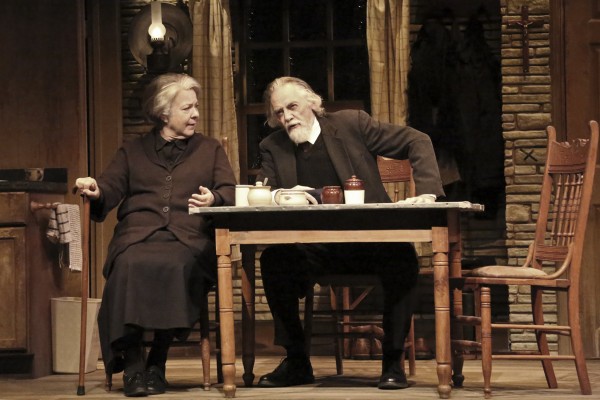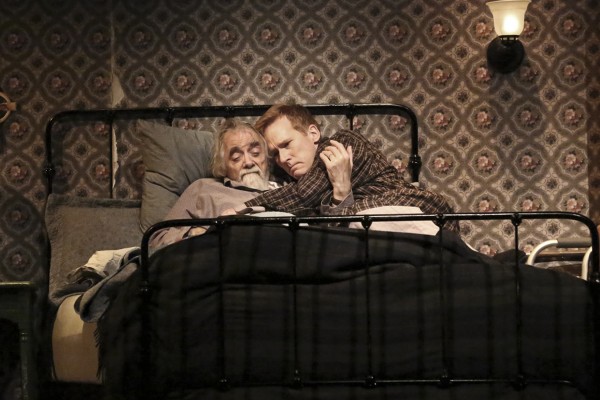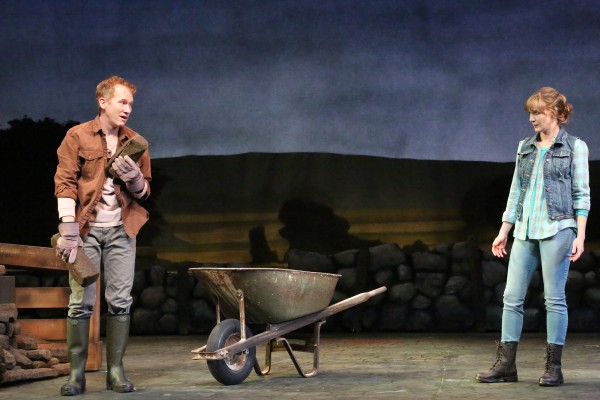Let’s face it, I’ve always been partial to John Patrick Shanley — the playwright and his work. He has always been a charmer, and the work has always been prolific, original, diverse, smart, tender, funny, surprising. Always surprising.
In one of Shanley’s earliest plays, Danny and the Deep Blue Sea (1984), he took on a favorite subject: the redemptive power of love (hold that thought). In the wildly different Dirty Story (2003), he explored allegory, exploding the distance between the Israelis and the Palestinians with the meddling interventions of the English and Americans. His screenplay for Moonstruck rightly won him an Oscar. And then came his play Doubt, A Parable (2004) that won him pretty much everything else there was to win.
In an essay reprinted in the Geffen program that Shanley had authored for the New York opening of Outside Mullingar, the writer explains it all: how he began, how he moved on, how he went home, and how he came to write Mullingar, his latest play and the first one set on Irish soil, yet still dealing with familiar themes of property, loneliness, love.
The Reillys and Muldoons, aging owners of adjacent farms have lived side by side their entire lives. Not necessarily peaceably. There is the matter of a small swath of land one neighbor sold to the other in a distracted moment that has divided them for years. Upon the death of old Chris Muldoon, the families are forced to re-examine the things that separate them as well as a few other unspoken grudges — unspoken, that is, until now, when it’s time to speak and speak about them. It all has to do with bad judgment, minor offences writ large, long memories, a good dose of shyness and, of course, the mysteries of love.

Yes, this little play is basically a love story, a tart and funny one, so we won’t go into much more detail as to how the younger generation of Muldoons and Reillys — Rosemary (Jessica Collins) and Anthony (Dan Donohue), respectively — eventually overcome family feuds to resolve their own tightly wound complexities.
Outside Mullingar is an older writer’s play, full of flashes of wisdom, humor and rue. It also must be acknowledged that it’s a pretty slender piece of theatre. The drama is so thin you can see right through it. It starts slow and ends abruptly. A bit too abruptly. But the poetry within is another matter.
Shanley has always claimed to be a poet and it shows in Mullingar. The poetry comes in wisps. A sentence here, a sentence there, running deeper than the drama. Take “modernization has run roughshod over the spaces between things…” Or Rosemary’s unsentimental take on depression: “Thinking’s worse than February.” And what definition of loneliness could possibly be more can more heartbreaking than “there’s no one left to catch you laughing…” ?
This Bronx-born Irishman captures the sweetness and humor of the Old Country with all the gumption of the new one. But at 90 minutes, Mullingar’s conversations, while robust, stay gentle, their wit competing with plain common sense. There are intimations of John Ford’s The Quiet Man in all this — not as imitation, but in the quaintness of the old Irish country ways that the play invokes.

Director Randall Arney keeps the action rolling, but his greatest achievement is his casting. Jarlath Conroy as old Tony and Robin Pearson Rose as the widow Muldoon are a feisty pair of sparring codgers whose quick minds and repartee far outrun their broken bodies. No wonder that their son and daughter are equally well matched as counterpoints, even if that bonehead Anthony has to be dragged kicking and screaming into realizing it. Donohue’s Anthony is more reticent in love, surely, than he really wants to be, and consequently Collins’ Rosemary is forced to be more forward with it than she ever intended. But then winning over as reluctant a suitor as Anthony does take a whole lot of doing.

Anthony T. Fanning’s sets, appropriately lit by Daniel Ionazzi, are so inviting, especially the old stone farmhouse (where we can’t see the age or the dirt) that you kinda want to move in. David Kay Mickelsen’s costumes never disappoint and neither does Jonathan Burke’s sound design.
No, this play is not Pulitzer or Tony material. It does not tackle the Big Issues, but it does offer some rewards, even as it feels, well, slightly undercooked. Don’t go in expecting the moon or Moonstruck, because it is something else. Call it a reflective 90-minute respite from the stress of daily living. And it will leave you smiling.
Top image: Dan Donohue and Jessica Collins in Outside Mullingar.
Photos by Michael Lamont.
WHAT: Outside Mullingar
WHERE: Gil Cates Theatre at The Geffen Playhouse, 10886 LeConte Avenue, Los Angeles, CA 90024.
WHEN: Tuesday-Fridays, 8pm; Saturdays, 3 & 8pm; Sundays 2 & 7pm. Ends Dec. 20. No performance today, Thanksgiving Day.
HOW: Tickets $32-$82, available at www.geffenplayhouse.com or by phone at 310.208.5454 or in person at the Geffen Playhouse box-office.
